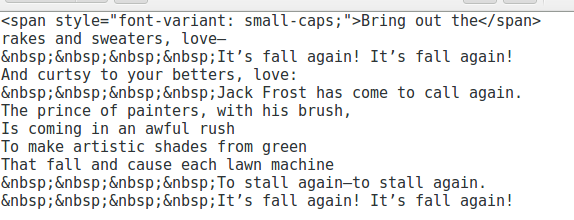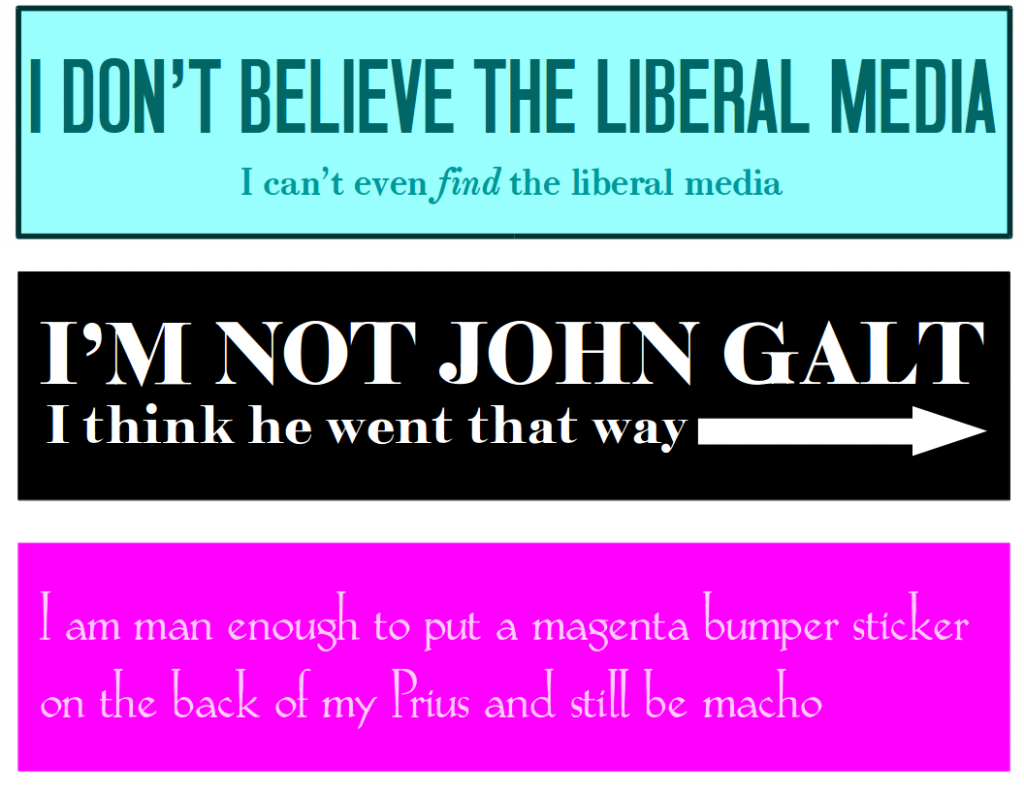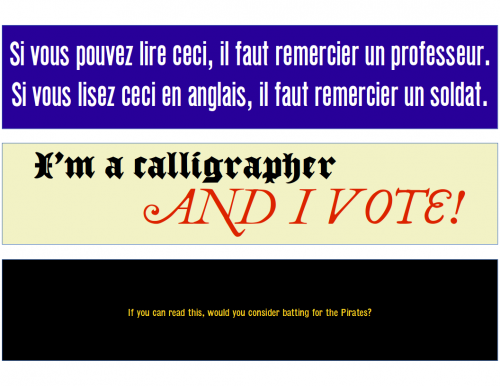Posts filed under “Poetry”
MORE ON WORDPRESS AND POETRY.
[An update: WordPress now includes a “Verse” block that makes it possible to format poetry visually. It took many years, but it finally happened.]
Our suggestion that WordPress needed a poetry plugin provoked a number of helpful comments. “Sigivald,” for example, wrote:
I suggest the reform of simply banning poetry.
It’s much simpler, and therefore the preferable course.
“Captain DaFt” suggested a clever way of turning up genuinely useful information in the WordPress forums; and “fred” put quite a bit of work into a demonstration of CSS techniques, all of which the WordPress comment system promptly nullified, because WordPress does that.
All these suggestions are useful.
Banning poetry, for example, might cause us to lose two or three masterpieces, but it would spare us tens of millions of soul-withering lines from shallow people with deep feelings.
The WordPress forums are full of people asking how to format poetry. They get helpful responses: you can use CSS, in effect writing a poem-constructing program somewhat longer than the average poem it will be used to construct. You can use nonbreaking spaces, being aware that they will periodically disappear. You can use the “pre” tag.
The “pre” tag activates your default ugly monospaced font. (This is true, by the way, in ebook readers as well.) One would not want to use that for publishing poetry:
I see beneath the crystal bow,
And Gaul and German, Russ and Turk,
Each with his native handiwork
And busy tongue.
It is possible to redefine that behavior in the WordPress theme by specifying a proportional font, making the “pre” tag probably the best choice for a poet who expects to write a lot of poetry and is willing to deal with the small alterations in CSS for his chosen theme. [Another update: This is what Dr. Boli has done here on the site, so that the demonstration above looks much better than it looked when the article was published.] Even then, though, indenting lines with a bunch of spaces is a sloppy and tedious task, made sloppier and tediouser, and in some more complex forms impossible, if the “pre” tag is redefined to specify a proportional font. [An update: A commenter below mentions custom stylings for the “pre” tag, but, having tried the experiment, Dr. Boli is delighted to report that WordPress, at least with the theme he tried, simply ignores those custom stylings. It is therefore necessary to revise the theme itself.]
What the poet wants is to be able to say, “I shall set the beginnings of all lines of this sort here.” One can do that with an early-twentieth-century mechanical typewriter by pushing the “tab set” button. It is very strange that one cannot do it at all with a sophisticated twenty-first-century content-management system.
At any rate, it is absurd to say that prose writers should just be able to go ahead and write, but poets need to teach themselves the intricacies of CSS. The average poet will not be as stubborn as Dr. Boli about making his own WordPress theme when he cannot find one that meets his needs. Nor should he be limited to one WordPress theme. There should be some way to make the mechanics of formatting simple and transparent, so that the poet can just write poetry. After all, it is always possible (however unlikely it may seem) that, having all the traditional forms of poetry easily available to them without any tedious labor or programming skills, a few poets may start to write good poetry.
A PLEA TO WORDPRESS PLUGIN DEVELOPERS.
[An update: WordPress now includes a “Verse” block that makes it possible to format poetry visually. It took many years, but it finally happened. The block is much more simpleminded than what Dr. Boli proposed in this article, but it does at least preserve spacing used as indentation.]
You can tell the Internet was invented after the death of poetry, because HTML, the engine that formats the World-Wide Web, has no way of dealing with even the most elementary poetic form—such as, for example, a ballad.
Here is a stanza from a ballad by Thackeray:
It is perfectly simple; there is not a simpler poetic form. But how would one achieve those simple and obvious indentations in HTML?
One might add spaces at the beginnings of lines. But it won’t work, because, like most of the Internet, one uses WordPress. And WordPress will look at a series of spaces at the beginning of a line and panic. “How did those get there?” it will say. “I’ll get rid of them at once, before anybody notices.”
You may recall that, two days ago, Dr. Boli published a little poem whose form was not especially complex, but nevertheless required indenting some of the lines. The only practical way to do that is by adding codes for nonbreaking spaces.
Here is how the poem looked while it was being set in WordPress type.
 That, you will agree, is very cumbersome; but we have not come to the worst part. Here is the worst part: that article is uneditable. If one needs to change as much as a single comma, one will lose all the formatting, because before opening the post for editing, WordPress will have another panic attack. “Nonbreaking spaces!” it will wail in a quavering and slightly tinny voice. “Something terrible must have happened!” And the formatting is gone forever.
That, you will agree, is very cumbersome; but we have not come to the worst part. Here is the worst part: that article is uneditable. If one needs to change as much as a single comma, one will lose all the formatting, because before opening the post for editing, WordPress will have another panic attack. “Nonbreaking spaces!” it will wail in a quavering and slightly tinny voice. “Something terrible must have happened!” And the formatting is gone forever.
One can, of course, maintain a copy of the post in a text editor, as Dr. Boli has done. It is also possible to define CSS styles that can be applied to different lines and add them to the WordPress theme. But the point of using software like WordPress, instead of composing in straight HTML, is to be able to get on with the business of writing without having to think about HTML code. Just think how ugly the code would be if the form of the poem were only a little more complex:
This is a serious problem for the whole Internet. Although poetry has died as a category of commercial publishing, it is still practiced as a craft, in the same way that people make pictures out of macaroni without ever expecting to go into the macaroni-picture business on an industrial scale. By the most conservative estimate, there are approximately one gazillion poetry bloggers typing their witterings into computers right now. They find it impossible to write poems with any form at all; their development as artists runs into the stone wall that is WordPress.
What the world desperately needs is a poetry plugin for WordPress. A worldwide publishing empire does not run itself, and Dr. Boli does not have time to figure out the WordPress plugin system and write the thing on his own. But it should not be difficult for someone experienced in that sort of programming.
Here are the features we desperately need:
1. When we are writing poetry, single-spaced lines must be the default.
2. Lines that run over must receive a hanging indent automatically.
3. It must be possible to begin a line at any arbitrary distance from the left margin.
4. It must be possible to remember that arbitrary distance in some way so as to create a class of lines with the same indentation.
5. It would be desirable to have a small number of standard styles, so that, for example, one could choose a “Ballad” style and have every second line indented automatically.
The poets among Dr. Boli’s readers can probably think of a few other features that would be necessary or useful. And if there are any programmers out there looking for a project where the task is not too challenging but the gratitude earned from the literary world would be enormous, here is one you might consider.
SONG OF AUTUMN.
Bring out the rakes and sweaters, love—
It’s fall again! It’s fall again!
And curtsy to your betters, love:
Jack Frost has come to call again.
The prince of painters, with his brush,
Is coming in an awful rush
To make artistic shades from green
That fall and cause each lawn machine
To stall again—to stall again.
It’s fall again! It’s fall again!
RHYME IS UTTERLY DEAD.
W. S. Gilbert, counting the possible rhymes for “sidestep” and coming up with a perfectly enormous number.
—
Rhyme is so completely dead that its most elementary principles have been forgotten. And when Dr. Boli says “forgotten,” he does not mean that high-school literary magazines occasionally publish poems with questionable rhymes, or that guitar-strumming coffeehouse singers sometimes allow a half-rhyme to slip by in their enthusiasm for the deep emotional truths revealed in their songs. No, Dr. Boli means that the people who set themselves up as the experts on the language seem to have no idea how rhyme actually works.
If you go to the Merriam-Webster site and look up “sidestep” (but don’t trouble yourself: Dr. Boli has done it for you), you will be told that it is pronounced with the accent on the first syllable. And then you will be given this list:
Rhymes with SIDESTEP
crowstep, doorstep, footstep, goose-step, half step, instep, in step, keep step, lockstep, misstep, one-step, quickstep, route step, salep, two-step, unstep, whole step
It is not that the list includes a few questionable rhymes. Remarkably, the experts at Merriam-Webster have produced a list of rhymes for “sidestep” without a single rhyme for “sidestep.”
Rhymes must fall on accented syllables, or at the very least on secondary accents. (Mr. W. S. Gilbert, who knew something about rhyme, considered secondary accents humorously dodgy rhymes, and always called attention to them with unorthodox spelling:
So they be,
Frequentlee.)
If your line ends with an unaccented syllable, then you have to go back to the previous accented syllable to find the rhyme. The accented syllable and whatever comes after it make the rhyme.
There are even technical terms for these phenomena. A rhyme of only one syllable is a masculine rhyme; a rhyme with two or more syllables is a feminine rhyme.
Now, is that really so hard? Sidestep, wide step, bride step, misty-eyed step, misapplied step, justified step, dandified step.… Anyone can do it.
See the bride step
Down the aisle.
Will she sidestep
With a smile
While her mother
And her brother
Beat a passing Francophile?
Here we demonstrate all the species of rhymes we have mentioned: feminine, masculine, and one rhyme on a secondary accent.
Now that you have read this article, you are a greater expert on rhyme than anyone who works for Merriam-Webster, and you are authorized to sneer in public at anyone who cannot understand why “quickstep” does not rhyme with “sidestep.”
BUMPER STICKERS.
Dr. Boli always classifies bumper stickers as poetry, believing that they are our native equivalent of the Greek epigram or the Japanese haiku. Here, then, are three more delicately and economically expressed thoughts. Click on the image to enlarge it, or you may have the collection in PDF form.
A SONG OF CHEESE.
A correspondent writes:
Dear Dr. Boli, I’m longing for a lyric poem about the wonders of cheese. Can you recommend one or have you written one? —Pining in Perry Hilltop.
Dr. Boli is always at the service of his readers, and having ransacked his notebooks, he came up with this little lyric that should satisfy his correspondent.
Upon reflection, it occurs to Dr. Boli that a better answer to his reader’s question would have been “No.”
ASK DR. BOLI.
Dear Dr. Boli: My English teacher wants us to write a poem. It’s supposed to be about something that’s personally meaningful to us, but other than that she didn’t tell us anything except that it’s due Wednesday. She showed us some poems other students wrote, and from those I don’t even know how a poem is different from an essay, except that the lines are shorter. So what is a poem, and how do you write one? —Sincerely, Emily, Mrs. Prong’s Eighth-Grade English Class.
Dear Miss: As so often happens, there are two different answers to your question: the real answer, and the answer that will bring you success in school. In the real world, a poem is “a metrical composition,” as our old friend Dr. Johnson would define it. Meter is what makes a poem. It is possible to write a poem without a regular meter, as Walt Whitman did so well; but if you do so, you had better have a sense of rhythm as perfectly developed as Walt Whitman’s, or what you have is not a poem but a prose composition hacked into short lines.
The “poem” your English teacher desires you to write, however, is a prose composition hacked into short lines. You will often find that what you are taught in school is the exact opposite of reality, but as you grow older you learn to adapt to it instinctively. The good news for you is that a school “poem” is much easier to write than any other form of composition. It requires no research: in fact, research is frowned upon, because, as you mentioned, the poem is meant to be “personally meaningful,” which you may interpret as “made up out of your own head.” You may be confident that you are doing something wrong if this homework assignment takes more than ten minutes of your time.
As for the specific content, remember that you will be graded on your sincerity. This is, of course, a trap, because if you write down what you sincerely think and feel, you will probably be suspended if not expelled. So it is important that you simulate sincerity effectively. Write about finding a dead bird on the sidewalk and how sad it made you feel. That pretty much always gets you an A.
BUMPER STICKERS.
The one truly American form of poetry is the bumper sticker, the equivalent of the haiku of the Japanese or the classical epigram. Click on the image to enlarge it, or click here for a PDF version.
ASK DR. BOLI.
Dear Dr. Boli: Why is it that establishments where cheerful and polite customer service is normally a point of pride will nevertheless post a vulgar notice on the front door that says “NO SHIRT, NO SHOES, NO SERVICE”? It is not that I object to the dress code—I myself seldom go shopping in less than full morning dress. But I do not like to be spoken to in that tone of voice. —Sincerely, Albert van Vaughan Andover-Ewart, Schenley Heights.
Dear Sir: People will forget themselves and their breeding if they feel they have come up with a very clever put-down. Even the well-intentioned and well-bred find the vulgar cleverness of the slogan “NO SHIRT, NO SHOES, NO SERVICE” irresistible. The only way it could be rendered more clever is by adding rhyme, which would make it positively mesmerizing to the middlebrow mind:
IF YOU DON’T WEAR A SHIRT
YOU’RE GONNA GET HURT
or
WHAT, NO SHOES, SIR?
YOU’RE A LOSER!
In fact, even as Dr. Boli makes these facetious suggestions, he suspects that someone somewhere will find them, fall under their thrall, and post them in a store window. The only way to break the upward spiral of vulgarity is for county health codes, in addition to specifying the minimum clothing required in commercial establishments, to specify the wording of the posted notice as well, which should be something like this:
SHIRT AND SHOES REQUIRED
BY ORDER OF DEPARTMENT OF HEALTH
Once that is accomplished, we can work on the question of whether anything else should be required, or whether we shall continue to raise no objection to sans-culottes shopping in our stores.






